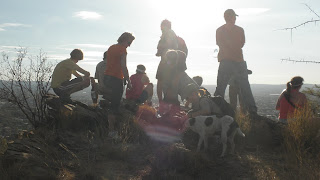I was afraid, in my heart, that at the age of twenty four I had finally celebrated my last Halloween. After all, they don’t really do Halloween here in Namibia – the stores are all displaying Christmas decorations at the moment, and the only Halloween party we found in town seemed to be geared for ten year olds, which was not really my scene.
Instead, I decided to celebrate Halloween in my own special Namibian way: hiking up a mountain in costume. followed by the important Halloween tradition of drinking. To do this, I joined the Namibian chapter of Hashers, who were embarking on a Halloween Hash.
Previous to my arrival in Namibia, the word “hash” to me either referred to drugs, the #, or a breakfast food. Apparently it also refers to social groups all over the world who follow special traditions, rituals, and rules that loosely remind me of Freemasons. One of the Hashers explained the story to me. The first Hash was started by a bunch of bored British soldiers who went on weekly hikes with the objectives of (according to their Constitution):
1. getting rid of their hangover
2. getting some exercise
3. drinking some more
I thought these principles were pretty sweet.
This week, as I alluded, the Hashers were going to do their hike in the hills behind Ludwigsdorf, in full Halloween costume. We looked pretty awesome.


The Hashers were a mix of local Namibians and foreign expats, mostly Americans. They had a series of rituals that I quickly had to familiarize myself with, including following marks on the trail that the Hares had set up beforehand, and being careful not to go off on the fake paths that they’d also set up, just for giggles. At certain points, folks would call out things like “On-on!” and “Checking!” – I still haven’t gotten the hang of when or why these were said.

"Richard Simmons"
I did however understand “Booze stop”.

At a particularly lovely spot of the trail, we sat on top of a cliff by a river bed and Hector (who looked a little crazy with his witch’s hat and cape) pulled out a bottle of homemade sake. Glasses were passed around, toasts were made, and the sake was drunk. Then we moved on.

After a while, climbing up the mountain got really hot so costumes were slowly shed. As we approached the summit though, the view just got better and better.

Once we reached the summit, we were rewarded with a beautiful view of the city. It was quite amazing. In front of us was the city of Windhoek, sprawled out much farther than anyone would ever expect a city of 300,000 to be. Behind us was pure wilderness.

There were more Hash traditions to follow after we descended from the mountain. Back at Karen’s house, we gathered around in a circle and initiated the newcomers, including me. This initiation involved us all introducing ourselves, and then chugging beer out of pisspots (yes, you read that right), and wearing them on our heads once we were done, while everyone sang “DOWN DOWN DOWN” all around us. It kind of felt like grown-up Cub Scouts. A spider jumped into my beer just as I started downing it, but I didn’t let that stop me (“there was an old lady who swallowed a spider…”). After the initiation of the noobs, a woman introducing herself as the Religious Advisor pointed out the “transgressors” of the day – those who had gone off the trail to take a shortcut, those who had answered their cell phones during the hike, those who hadn’t worn a Halloween costume or Hash gear – and those sinners also chugged beer in the middle of the circle while we sang silly songs.
Then came my favourite Halloween tradition – more drinks. Karen served us Halloween candy and Hector heated up the braai to cook the brats, which we enjoyed with a side of pumpkin and great conversation by the swimming pool. It was my most unique Halloween to date, and it certainly beat being snowed in.


Happy Halloween from Windhoek!










































